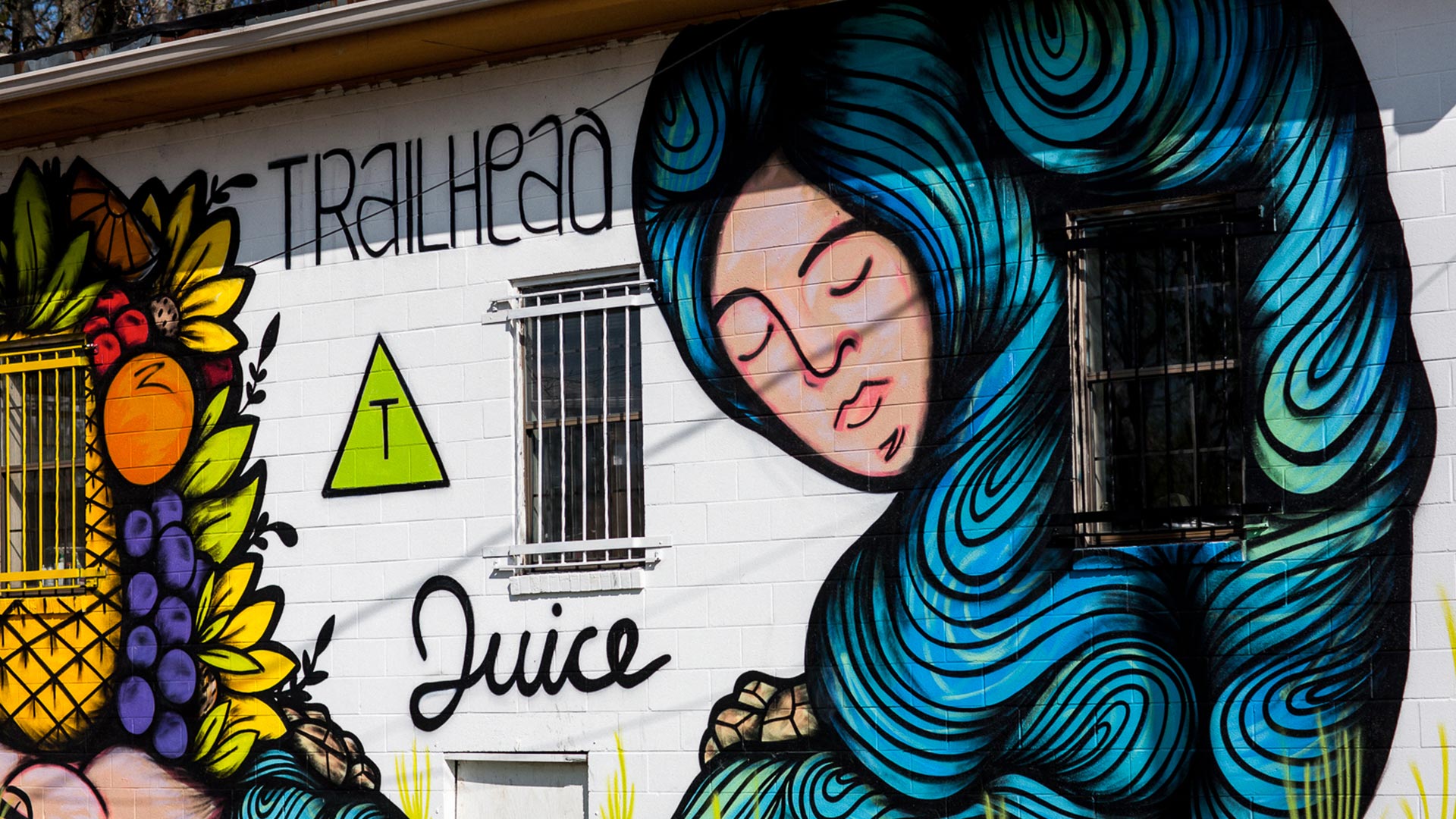The Blue Ridge is already known for its moonshine and microbreweries, but a new crop of flavorful and innovative beverages have been brewing (or fermenting) in these mountains lately. From sake to cider and soda to juice, we’re taking a look at the family-owned businesses that are bringing innovative new twists to the beverage industry and making the Blue Ridge a more exciting and diverse place to drink.
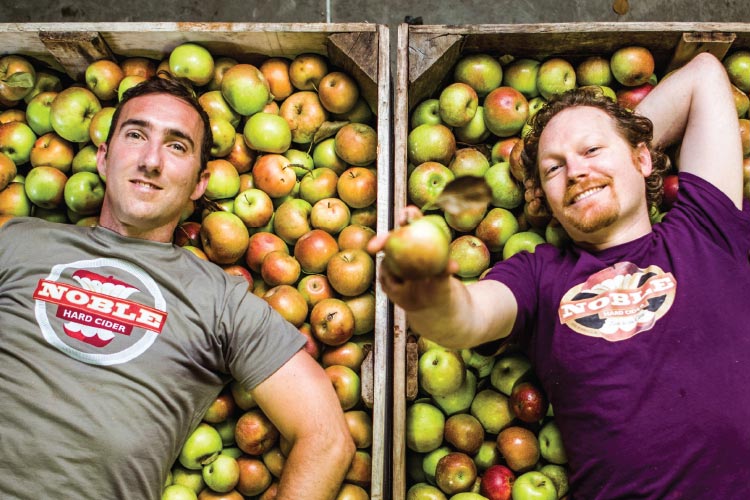
Cider
Noble Cider
Asheville, North Carolina
When Noble Cider’s co-founder Trevor Baker was laid off from his job in 2012, he took it as an opportunity to reevaluate his career options. Because his wife and future Noble Cider co-founder Joanna Baker had grain allergies, the couple was always on the lookout for non-grain based alcohols, but they weren’t so easy to find in Asheville. “We were amazed that there weren’t any cider makers in the area,” says Baker, “even though we had apples just down the road.”
So Baker, Joanna, and co-founder Lief Stevens, decided that they would fill that gap in the market. “We put it all together and said, hey, let’s do this,” says Baker.
He signed up for a 10-day commercial cider making class north of Seattle, and when he returned he immediately began working on the paperwork to create Noble Cider. “We rented a little multi-unit commercial space in South Asheville,” says Baker. “It all began in a tiny little garage.”
They launched with $17,000 between them. “It was bootstrapped for sure,” says Baker, “but we wrote a good business plan and leveraged that with an economic development loan. They were willing to take a gamble on us and that’s how we started.”
For the record, cider is fermented fruit juice, explains Baker. “Much like grape juice gets turned into wine, apple juice gets turned into cider. Cider is technically a wine. We don’t brew. We ferment.”
Initially, Baker and his co-founders built their own rack and cloth apple press and bought 8 plastic fermenters. They pressed 2,000 gallons of apples and launched on Memorial Day 2013. “We thought 2,000 gallons would last us until Labor Day, but we sold 2,000 gallons in a little over a month,” says Baker. “We were taken by surprise by that,” he remembers with a laugh.
Many of their apples come from right down the road in Anderson County, the biggest apple county in North Carolina. “We have juiced our own apples from day one,” says Baker, “first with a hand-built press and, more recently, with a commercial press and processing line.”
Today, Noble Cider is distributed all across North Carolina, upper South Carolina, Northeastern Georgia and in Nashville, Tennessee. This fall, they’ll open a taproom and restaurant in downtown Asheville. Baker says that his goal has never been about cider world domination but about opening up more taprooms around the state and remaining a regional company.
“Getting further and further out with distribution provides some logistical challenges,” he says. “In some ways distribution is not really suited to the type of cider we make. We aren’t fermenting Chinese concentrate in water, we are using expensive inputs, so our margins aren’t as good as a big cider company,” explains Baker. “We will stick to a regional model, and of course North Carolina,” he says, giving a nod to the place where it all started.
Bold Rock Cider / Mills River, N.C + Nellysford, Va.
Bold Rock was birthed in the Blue Ridge. With two cideries—one in Mills River, N.C., and the other in Nellysford, Va.—Bold Rock sources all of its apples from local orchards within 35 miles. Founded in 2012, Bold Rock has become the country’s largest independently owned cider company. Bold Rock produces seven colorful, flavorful ciders, including blackberry, rose, pear, Virginia Apple, and Carolina Apple. Bold Rock is distributed across the Southeast and Mid-Atlantic, but it’s stayed true to its Appalachian roots, crushing and crafting all of its hard cider in the mountains of Virginia and North Carolina.
Supreme Core Cider / Washington, D.C.
Known for their use of local fruit from family-owned orchards, Supreme Core’s brewery-style taproom has over ten different varieties of cider made onsite.
Ships Wheel Hard Cider / Charleston, South Carolina
Family owned and operated, Ships Wheel Hard Cider is pressed, fermented and bottled right at their orchard to ensure the freshest cider possible.
Treehorn Cider / Marietta, Georgia
Using apples grown no more than 150 miles outside of Atlanta, Treehorn Cider serves fresh, locally produced cider in their Marietta taproom.
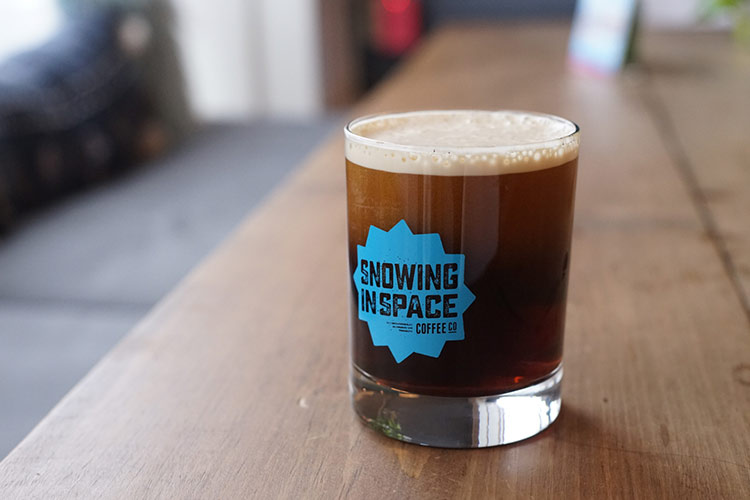
Nitro Cold Pressed Coffee
Snowing in Space Coffee
Charlottesville, Virginia
For years, Paul Dierkes, co-founder of Snowing in Space Coffee, was a sugar and cream in his coffee kind of guy. But that all changed when, in a rush, he ran into a deli to grab his daily cup and all they had was cold brew. Reluctantly, he ordered it. “I was taken aback by how easy it was to drink,” says Dierkes. “I didn’t need to add anything to it.” Dierkes, who has a marketing and advertising background in the craft beer industry, immediately started thinking about how the philosophy and business model behind craft beer could be applied to a cold brew coffee company.
He sat on the idea for a while before bringing it up to his wife. I told her, “I have all of these ideas and I normally don’t do anything with them, but I really think we have something with this one,” he says. When his wife gave the thumbs up, he asked his co-founders Joel Artz, who has experience in the craft brewing industry, and Damien Warshall, who has a background in operations and finance, to come on board. “We really wanted this innovative, experimental nitro coffee company,” says Dierkes.
Cold brew coffee is exactly what it sounds like: coffee that is brewed cold instead of hot. Snowing in Space steeps their coffee grounds in water over a period of 16-18 hours. Afterwards, the coffee is infused with nitrogen. The result is a creamy, less bitter, less acidic, ready-to-drink coffee with a longer shelf life.
Dierkes and his co-founders launched Snowing in Space Coffee in 2016. Initially they had just a single account, installing a few taps of nitro cold brew coffee into an office building in downtown Charlottesville. But the reception was positive, and in April 2017 they opened a taproom on West Main Street in Charlottesville across from the Amtrak station. “It’s more like a bar than a coffee shop,” says Dierkes. “We have 9 or 10 different styles on tap. You can get flights like you’d get at a brewery.”
Snowing in Space keeps it local, working with 10 different roasters from Virginia and D.C. “We are able to work with them to create unique styles using either a blend they’ve created or a single origin bean,” says Dierkes.
In June 2017 they introduced canned nitro cold pressed coffee to the marketplace. Their four flagship cans are now in over 200 independent retailers in Virginia, D.C., and southern Maryland. And while Dierkes hopes that the success of Snowing in Space Coffee continues to grow, he’s most concerned with keeping his current customers happy. “We are focused on making a really good product and getting it to the people of Virginia and D.C.,” he says.
Other Innovative Cold Pressed / Cold Brew Coffee Companies
Convergent Coffee Company / Richmond, Virginia
Using organic beans from local roasters, Convergent Coffee Company makes four delicious flavors of nitro cold pressed coffee.
Commonwealth Joe Coffee / Arlington, Virginia
With over 14 years of roasting experience, Commonwealth Joe’s brings their coffee to offices, retailers and the public via their fleet of Nitro Cold Brew trikes in Arlington.
Riptide Coffee / Charleston, South Carolina
Riptide roasts and cold brews single origin beans that are sustainably sourced from South America and delivers cold brew coffee kegs around the southeast.
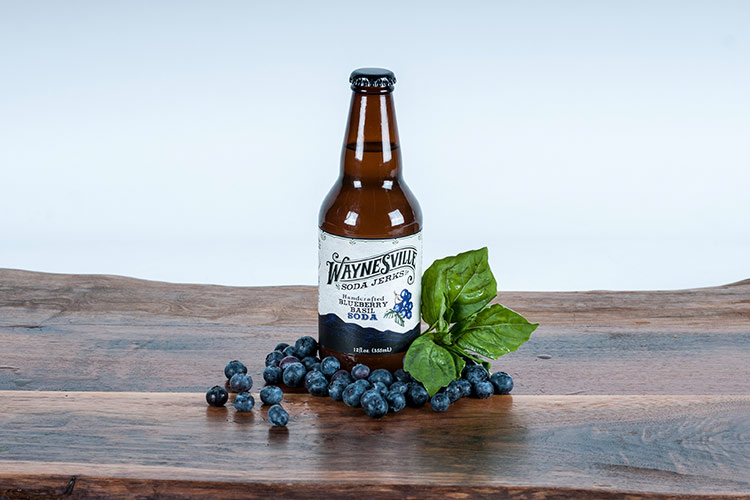
Natural Soda
Waynesville Soda Jerks
Waynesville, North Carolina
In 2013, Megan Brown and Chris Allen lived just a few blocks from the farmers market in Waynesville, North Carolina, where they shopped regularly. Visiting the market one day, they noticed that there weren’t any drink vendors. As employees of the local restaurant industry, they’d always hoped to strike out on their own, so they decided to start a small booth selling soda. “That was all we planned to do in the beginning,” says Brown. “But that first year it really took off.”
Born and raised in Haywood County, Brown and Allen say their motivation for creating a soda company runs much deeper than just creating a delicious beverage. “Both of our families have been in agriculture for generations,” says Allen. “We understand the importance and quality of local agriculture and we wanted to highlight that.” To that end, many of Waynesville Soda Jerk’s sodas are fruit based and highlight the produce grown at farms in and around Waynesville.
In 2015, Waynesville Soda Jerks began bottling their product. Today, they distribute primarily in Western North Carolina. Allen says that the reception has been overwhelmingly positive. “People want a product that is made with the same philosophies as craft brews,” says Allen. “They want products that are true to natural ingredients and are made with transparency in the supply chain.” Allen adds that some of their largest and most successful accounts are with breweries themselves. “Not everyone that goes to breweries drinks alcohol, but they want to have the same experience and quality,” says Allen.
But as passionate as Brown and Allen are about making soda, Allen says that their biggest goal is to have positive impacts on the local economy, either by growing Waynesville Soda Jerks or by starting other local businesses like the old-fashioned soda shop that Brown hopes to open one day. “It’s not just about the soda we make,” says Allen. “It’s about what is grown in this area and its potential.”
Other Innovative Soda Companies
Pure Sodaworks / Chattanooga, Tennessee
Made with pure cane sugar and real ingredients, Pure Sodaworks is known for crafting uniquely flavored natural soda like Orange Basil and Cucumber Wasabi.
Cannonborough Craft Soda / Charleston, South Carolina
Free from artificial preservatives and bottled in small batches, Cannonborough Craft Soda is made from fresh fruits, herbs and spices resulting in a refreshing non-alcoholic drink.
Brood Soda / Durham, North Carolina
Known for their use of citrus fruits, especially key lime juice, Brood soda is also made with natural herbs and, proudly, a little more sugar than other natural soda companies.
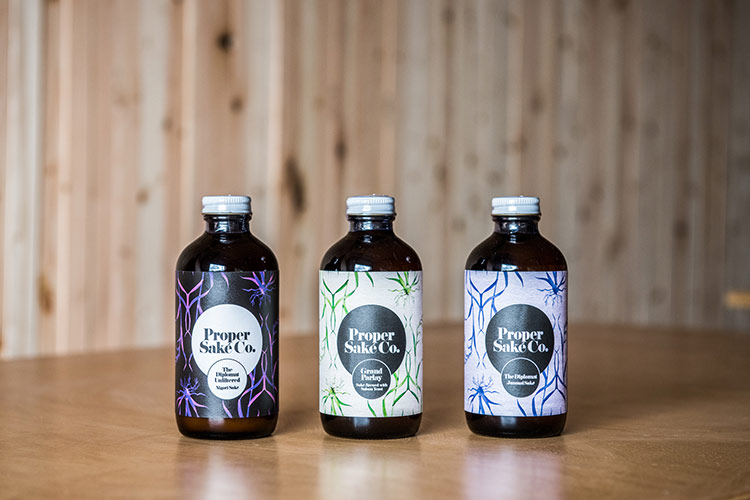
Sake
Proper Sake
Nashville, Tennessee
The first time that Byron Stithem tasted old world unpasteurized sake he knew he wanted to replicate it. “It’s not filtered, it’s not diluted, and it’s completely untouched by heat,” says Stithem. Taken by the taste, Stithem began brewing old world style sake at home. “My mission ever since has been to continue to perpetuate these cool and beautiful Japanese traditions in a way that is approachable to the western public.”
Sake, explains Stithem, is a simple concoction of rice, water, koji—the emblematic start used to carry out fermentation—and yeast. It’s not a distillate, as many people assume, but a natural brew. “At some point somebody accidentally left out a bowl of rice and water and it started to ferment and made a beverage,” says Stithem about sake’s origins.
Though the first sake may have been a fluke, there’s not much accidental about sake today. Stithem says that the sake he makes has an extremely identifiable back end flavor profile that lingers on the palate. And though sake is a natural brew like beer, the finished product actually has more in common with wine.
Stithem’s background is in culinary science, so after years of making sake at home and in culinary labs, he decided to open Proper Sake with a business partner. Together, they followed trends of exported sake from Japan and noticed that sake sales were rising steadily in the western world. Noting sake’s growing popularity in the U.S., Stithem and his business partner decided to take the leap.
But Stithem says that even if the data hadn’t suggested that the western world is beginning to pay attention to sake he would have started Proper Sake anyway. “I care deeply about sake and would like to see it have its day in the sun,” he says.
Proper Sake is currently distributed in Tennessee, Alabama and Louisiana and will soon be available in Georgia and North Carolina. In October 2017, Stithem opened a tasting room in downtown Nashville in the Pie Town neighborhood, close to the convention center.
Though the reception has been humbling, Stithem says he still has a lot of work to do. “Sake is such an unknown for so many people,” he says. “Now we just have to figure out how to get more people to consume it on a daily basis in their own homes.”
Other Innovative Sake Companies
North American Sake /Charlottesville, Virginia
Virginia’s first sake brewery is already creating quite the buzz. North American Sake is opening its doors in downtown Charlottesville this month and will serve sake on tap.
Ben’s Tune Up /Asheville, North Carolina
Though they’re not exclusively a sake brewery, Ben’s Tune Up blends rice and water to create fresh and cold American sake on tap.
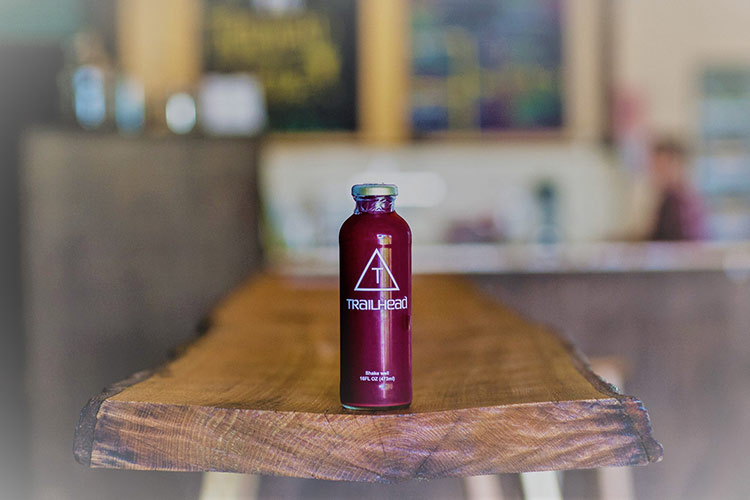
Cold-pressed juice
Trailhead Juice
Chattanooga, Tennessee
When you ask Michelle Sutter, owner of Trailhead Juice in Chattanooga, Tennessee, why she opened a cold-pressed juice shop, she doesn’t skip a beat. “I felt like the reason that people don’t take as good a care of themselves as they can is because it’s not convenient for them,” she says. Driven by her desire to provide healthy and convenient beverages to her community, Sutter launched Trailhead Juice in March of 2017.
Sutter sees Trailhead Juice as more than just a place where people can come to get nutritious and affordable fuel for their bodies. In her storefront, which is located at the end of Chattanooga’s river walk, Sutter allows local artists to display their work and local bands play on her patio. She also sells locally handcrafted goods in her shop. “It’s kind of a community center and juice bar,” she says.
But Sutter’s main goal is providing convenient and healthy drink alternatives to the community, something that she says cold-press juices do extremely well. “Traditional juicers spin like a blender,” explains Sutter. “So they heat the vegetables and fruit and a lot of nutrients are lost. With cold press nothing is heated. The produce is brought in fresh, rinsed and put through a hydraulic press that squeezes the pulp through cheesecloth. Since there’s no heat, there’s no loss of minerals, vitamins and nutrients,” she says.
The benefits of cold-pressed juice, says Sutter, are vast. “Juicing allows the digestive tract time to rest,” she explains. “The juice is absorbed through the stomach lining straight into the bloodstream so there is no digestive process. There’s no waste, so to speak. It’s a shot of health straight to the bloodstream.”
Sutter uses as much local produce as possible and says her goal is to bring her cold-pressed juices to as many people as she can reach in Chattanooga and beyond. “In the next five years I’d like to have at least two more storefronts,” she says.
Sutter also says she’d like to take the show on the road. “I’d love to get a trailer and travel the city going to the strawberry festival, musical festivals and art festivals, “Sutter says. “I want to educate people on the benefits of juicing and offer the alternative in a lot of places where it’s not available.”
Other Innovative Cold-Press Juice Companies
Franklin Juice Company / Nashville, Tennessee
Serves up organic cold-pressed juices and acai bowls since its inception in 2014.
Gundalow Juice / Baltimore, Maryland
Free from added sugar, added water, and caffeine, the juices made at Gundalow Juice are made solely with fruits and vegetables and bottled without the use of preservatives.
Cold Off the Press / Raleigh, North Carolina
Unpasteurized and raw, Cold Off the Press juices can be delivered directly to your door in Raleigh, Durham and throughout the triangle.
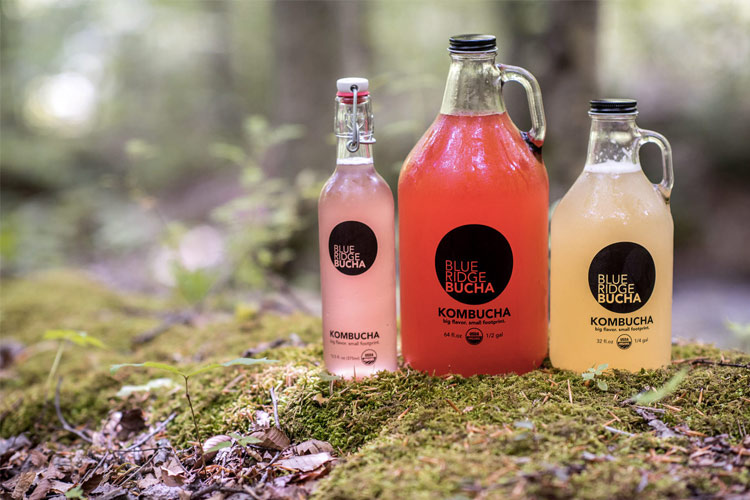
Kombucha
Blue Ridge Bucha
Waynesboro, Virginia
Sixteen years ago, Kate Zuckerman’s husband, Ethan, was a college student in California. One fateful day, Ethan’s roommate brought home a scoby—a symbiotic culture of bacteria and yeast that is used to propagate a fermented tea called kombucha—and Ethan started experimenting with it. “He really took to it,” says Zuckerman.
After years of homebrewing kombucha, the Zuckermans launched Blue Ridge Bucha in 2010. The company began as what Zuckerman refers to as a CSK (community supported kombucha), similar to a community supported agriculture program but with kombucha. “People would sign up for weekly shares and we would brew to order,” says Zuckerman.
Extremely passionate about protecting the environment, the Zuckerman’s made sure that clients returned and reused their bottles. That worked for a while, but eventually “we turned more into a bottle washing company than a kombucha brewing company,” says Zuckerman.
In order to remain true to their low waste mission, the Zuckerman’s decided that they had to figure out how to get kombucha into kegs—a groundbreaking move at the time. There was one company on the west coast kegging kombucha, and Ethan flew out to learn.
Back in Virginia, the Zuckermans started distributing their kegs of kombucha. They now also have a pre-packaged, pre-filled bottle line that is refillable on draft. And in June, they launched a new taproom on the east side of Waynesboro. “The focus is on a non-alcoholic craft beverage and a family friendly environment,” says Zuckerman.
While the Zuckermans are excited about the future of Blue Ridge Bucha, they’re most excited about the fact that they’ve managed to build a brand and a customer base that’s committed to reducing waste. “One thing that is most inspiring to me and Ethan is that customers say, ‘I started refilling my bottles and that also made me bring my bags to the grocery store and turn off the water when I brush my teeth,” says Zuckerman. “There is an extra step that you take to commit to drinking our kombucha.”
Over the years, Zuckerman estimates that her customers have saved over 800,000 bottles by reusing. It’s a stat that illustrates that Blue Ridge Bucha really lives up to their tagline: big flavor, small footprint. And that mind toward conservation isn’t going anywhere soon. “We are really looking forward to the million bottles saved mark,” says Zuckerman.
Other Innovative Kombucha Companies
Buchi Kombucha / Marshall, North Carolina
Founded in a kitchen by two self-described moms, the owners of Buchi Kombucha opened the first commercial kombucha brewery in the southeast.
Golda Kombucha / Atlanta, Georgia
Georgia’s first kombucha company, the recipe for Golda Kombucha tea comes from Golda herself, a vivacious nonagenarian who has been brewing her family recipe for over forty years.
Wild Kombucha / Mobtown Fermentation / Baltimore, Maryland
Mobtown serves up fruity flavors of kombucha such as mango, peach, and apple spice.

Beer Here
There’s no shortage of breweries in the Blue Ridge. But if you’re looking to grab a pint at a place that serves up delicious beer and a consciousness towards protecting the streams and forests that we love, make a pit stop at one of these conservation-minded breweries.
SweetWater Brewing Company / Atlanta, Georgia
Twenty-one years ago, Freddy Bensch founded SweetWater Brewing Company. An avid outdoorsman, Bensch named the company after SweetWater Creek, his favorite place to paddle, fish, and be in nature. From the beginning, SweetWater Brewing has been passionate about protecting natural resources. Each summer, the company gives away $100,000 to conservation groups that clean up the waterways and protect natural habitats in their distribution area. Stopping by SweetWater? Try the 420 Extra Pale Ale.
Wild Wolf Brewing Company / Nellysford, Virginia
From a very young age Daniel Wolf, brewmaster and co-founder of Wild Wolf Brewing Company, was taught the three R’s: reduce, reuse and recycle. He grew up with a respect for the environment and an understanding that natural resources aren’t easy to replace, so when he opened Wild Wolf Brewing in 2011, he brought those principles of conservation with him. The brewery sits on 10 acres of old farmland and has 500 square feet of food and pollinator gardens and a hop yard where chickens roam, eating bugs and fertilizing the land. Wild Wolf also composts all of the food scraps that come out of their kitchen, except for proteins. “We are always asking ourselves how we can be better,” says Wolf. Stopping by Wild Wolf? Try the Blonde Hunny.
BearWaters Brewing Company / Canton, North Carolina
Situated on the bank of the Pigeon River, water plays an important role in everything BearWaters Brewing does. “We want people to know about the importance of water and what it means to take care of our streams and rivers,” says co-owner Art O’Neil. Each beer that BearWaters distributes is attached to a particular cause with a percentage of the proceeds going to non-profits like the Haywood Waterways Foundation. Large aquariums inside of the brewery feature species from the river and a grant from the Pigeon River Fund has helped with bank restoration. BearWaters Brewing also recently put in boat access so people enjoying the water can stop in and grab a beer. “We are trying to be a spokesperson of the river and let people know why they should get in and enjoy it,” says O’Neil. Stopping by BearWaters Brewing? Try the Heavy Cream Milk Stout.
Alliance Brewing Company / Knoxville, Tennessee
When your Head Cellarman and COO is a retired mechanical engineer, you come up with innovative ways to reduce water waste. At Alliance Brewing, when employees clean tanks, the water and chemicals are siphoned back out and saved so that they can be used again in the cleaning process. Alliance is a member of Brewers for Clean Water, a cause that is important to the company not just because their beer is made with water, but because their brewery is located on the banks of the Tennessee River where the Holsten and French Broad Rivers meet. Stopping by Alliance Brewing? Try the Citra Blonde.
Pisgah Brewing Company / Black Mountain, North Carolina
Founded with the tagline, ‘We all drink downstream,’ Pisgah Brewing’s general manager Benton Wharton says that the phrase is meant to remind people that everything we do affects our community. That community mindedness has produced some great partnerships for Pisgah, including a 13-year relationship with the Foothills Family Farms, where all of Pisgah Brewing’s spent grains are sent to feed the local livestock. Pisgah also uses all organic grains and malts in their brews and all other ingredients that are sourced as close as possible. Those were conscious choices, but when it comes to the water in their beer they just got lucky. “We have a clean and closely sourced watershed,” says Wharton. “For us, the process of making beer is simple.” Stopping by Pisgah Brewing? Try the Pisgah Pale Ale.
